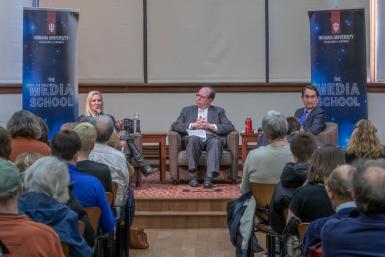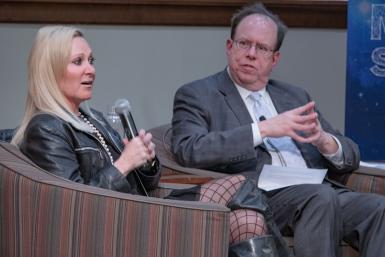Enemies of the Press panel discussion reverses Trump-created nickname
About a month into his presidency, President Donald Trump bestowed a nickname upon the news media in a tweet: “the enemy of the American people.”
The since-repeated phrase has spurred broad debates about truth, rhetoric and the relationship between the executive branch and the Fourth Estate.
The FAKE NEWS media (failing @nytimes, @NBCNews, @ABC, @CBS, @CNN) is not my enemy, it is the enemy of the American People!
— Donald J. Trump (@realDonaldTrump) February 17, 2017
Associate professor Tony Fargo, director of the Center for International Media Law and Policy Studies, wanted to turn the phrase around Monday with The Media School’s Enemies of the Press panel.

“We decided to flip the script a little bit and talk about the enemies of the press,” Fargo said to an audience of about 150 people in Presidents Hall.
Fargo moderated the discussion, hosted by the Barbara Restle Press Law Project. The panel featured CNN attorney Lee Williams and New York Times correspondent Michael Tackett, BA’81.
Williams advises on daily editorial newsgathering and publication for CNN programs, including its investigative unit, its international bureaus, CNN International and others. Tackett covers national politics for The New York Times from its Washington, D.C., bureau.
It’s not entirely productive to lay sole blame on the president, Tackett said. However, it is interesting to see how the climate, especially surrounding the press, has changed in recent years.
“The climate is one of hostility, and hostility tends to breed things that we don’t want to think about,” Tackett said.
Words matter, Williams said. They especially matter when they’re coming from world leaders. Rhetoric can empower people, and when they use that rhetoric against the press, it affects how journalists do their jobs, she added.
“Our reporters are people just like you and I, so when you intimidate them, that will ultimately have a chilling effect on what they report,” Williams said.
This chilling effect could cause reporters not to cover certain events, not to talk to certain sources, to only tell certain stories, Williams said.
When it comes to the public’s perception of the press, however, Williams places partial blame on the media. Some members of the press have accepted the hostile environment they’re in and have begun to change the way they tell stories.

“We need to tell the accurate story, but the complete story,” Williams said.
Looking ahead to the upcoming 2020 election, Fargo asked the panelists their thoughts on the media focusing more on the horse race of an election rather than the issues.
Tackett said he doesn’t necessarily agree that the news only focuses on polls, but the media missed a large portion of Trump supporters in 2016.
He said he expects coverage for 2020 to be different. Journalists have to deliver all of it: polls and issues, Tackett said.
“I would hope that you judge us by the totality of the coverage rather than isolated stories,” Tackett said.
The panelists also discussed the impact of social media and constant changes in the media landscape on journalism.
Social media has influenced news organizations to start to give up on the idea that they need to be first with their news, Williams said. It’s more important to be accurate.
Media organizations are learning to press pause before publishing something right away, she added.
Tackett agreed, saying journalists need to make themselves reflect.
“We try to step back when we can,” Tackett said.
Consumers need to pay more attention to their news, who the source is and where it’s coming from, Williams said. They should also be careful not to mix what they see on social media with what’s actually happening in the news.
“There are people out there who do want to put out fake news,” Williams said. “I do think you need to pay really close attention to that.”

